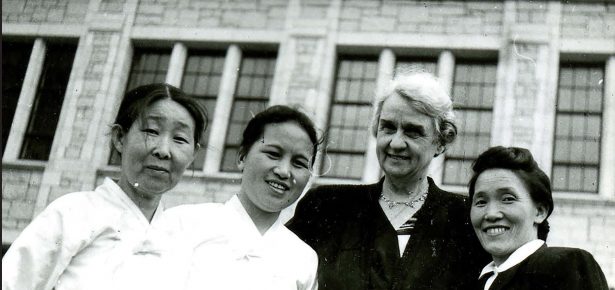
Travel has been deeply ingrained in human history. In this time of COVID-19 lockdowns, international travel has become especially limited, even banned. To be sure, the internet offers a virtual landscape for curious minds to wander, bringing the world to home. Exploring the world by clicking around on the internet is comparatively low-cost, safe and instant. Thanks to virtual communication technologies, we can even “meet” people virtually anywhere in the world. Yet, despite the convenience of online exploration, people still yearn to travel for various reasons, whether it is educational, political, religious, economic or cultural.
Crossing borders used to be the privilege of men; however, that changed in the modern era. From the nineteenth century, at the height of Euro-American imperial expansion, women also began to travel extensively. Women from disparate places and cultures drew inspiration from each other through direct interactions as well as through writing and visual materials that were globally circulated. Korean women joined this modern trend at the turn of the twentieth century. For Korean women, who had been confined to the inner quarters for centuries due to Confucian gender norms during the Chosŏn dynasty (1392-1910), it was almost revolutionary to move beyond the traditional bounds of family and nation to pursue education overseas and to experience the world.
I made my first solo international trip as a graduate student in the late 1980s, traveling from South Korea to the United States. That journey turned out to be one of the most significant turning-points in my life and work, and because it had such a profound impact on me, I became intrigued by the stories of the elite Korean women who had traveled to East Asia, Europe, North America and Australia to pursue education or attend conferences in the early twentieth century when Korea was under Japanese colonial rule (1910-1945). What enabled them to travel? What was it like for them to travel and get educated overseas as colonized subjects in pursuit of modern womanhood? What does their experience tell us about gender, modernity, colonialism and nationalism?
In tracing the travels of these elite women in Korea and overseas, globally connected Christianity stood out prominently as a major facilitator in enabling women to travel and get educated. Japan as a colonial power surely played a critical role in shaping gender relations. Yet, as I argue in my book, Gender Politics at Home and Abroad: Protestant Modernity in Colonial-Era Korea, the formation of modern gender relations in Korea was rooted in the transnational experience of Koreans and not in a simple nexus of the colonizer and the colonized. Japan as a latecomer in the imperial race was constantly confronted with the dominant cultural and material power of Europe and the United States. One of the key agents in conveying ideas of “Western modernity” in Korea was Christianity, especially US-led Protestant missionary organizations. Introduced in Korea in the late nineteenth century, Protestant Christianity was deeply associated with the ideas of modernity in Korean perceptions. It had a particularly far-reaching impact on women’s world. One can find powerful imprints of Christian domesticity in the gender ideology of “wise mother, good wife” and the experience of modern house and home. Significantly, the largely conservative gender ideology of Protestant Christianity actually opened up new opportunities for women to travel globally and pave new grounds in the public domain as professionals and social reformers. Furthermore, Korean women’s encounters with modernity via colonial power of Japan and non-colonial powers of western countries illustrate that they were far from being passive recipients of “advanced” modern developments. Their writings and activities show how their transnational experiences helped them develop keen sensitivity to local and national particularities in envisioning the future.
Latest Comments
Have your say!